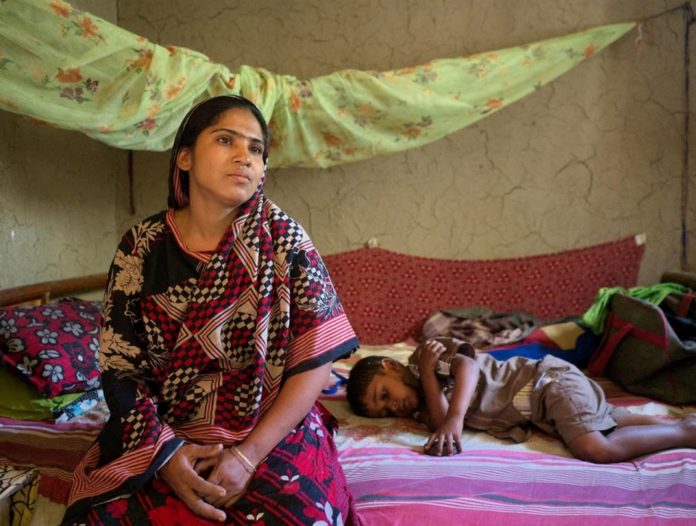by Kabir Humayan
DHAKA, April 7, 2017 (BSS) – Bangladesh’s children are most vulnerable to climate change as some 1.31 million of them fell sick in six years due to onslaught of several natural disasters, official data showed.
The country national statistical body–Bangladesh Bureau of Statistics (BBS)–in a survey showed that the climate change impact also hampered the education of the children as some 1.08 million of the victims could not go to school in that period.
It also showed that children, aged 0 to 17, in Dhaka division are the worst victims of the climate change impact.
Out of the total 1.31 million victims, some 48.56 percent children fell sick due to the impact of flood, 12.15 percent for water-logging, 12.14 percent due to cyclone, 6.77 percent for drought, 5.33 percent due to thunderstorm and 15.05 percent for other seven kinds of calamities during the survey period.
The BBS statistics came from the survey result titled “Bangladesh disaster-related statistics 2015: Climate change and natural disaster perspectives”. The survey data was collected between the year 2009 and 2014.
Experts said the government must have a best and quick intervention on the livelihood of the disaster victims and their children to recoup their losses.
According to the survey, the children from Dhaka division were the worst sufferers of the natural disasters as some 21.70 percent of them fell sick during 2009 and 2014 period followed by Rajshahi division 15.44 percent, Sylhet division 13.77 percent, Barisal division 13.24 percent, Chittagong division 12.75 percent, Rangpur division 12.14 percent and Khulna division 10.96 percent.
Among the age groups, the 5-12 years of old are the most vulnerable as 54.24 percent of the total 1.31 million children are affected by different types of sickness due to the impact of disasters, while 25.13 percent get sick from the 0-4 years of age group and the rest 20.63 percent from the age group of 13-17 years.
Meanwhile, the fates of the affected children are not better as most of them don’t get treatment from the registered and experienced doctors after their sickness. The statistics showed that only 19.70 percent of the victims receive treatment from the MBBS doctors.
The BBS data showed that highest numbers of sick children (26.04 percent) got treatment from the paramedics, medical assistants or nurses; 23.85 percent by pharmacy; 23.44 percent by rural physicians; 6.32 percent by others; and the rest 0.65 percent did not receive any treatment.
The national statistical body also showed that among the 1.08 million children, 37.17 percent pupils failed to attend school for 8-15 days, 36.65 percent for 1-7 days, 21.36 percent for 16-30 days and 4.83 percent for 31 days or more due to the impact of the natural disasters.
Among them, the students of Barisal division are the most affected by the natural disasters as highest 24.56 percent pupils from this region could not go to school, while the rate in Dhaka division was 18.58 percent, Sylhet division at 18.34 percent and Khulna division at 7.15 percent.
Former primary and mass education advisor of the caretaker government Rasheda K Chouhury said the children are the worst victims of the climate change in Bangladesh as their livelihood is severely affected by its impact.
Coastal belt is the most vulnerable areas in the country as the inhabitants there frequently face natural disasters over the years which displace their life and works, she said.
“The frequency of the coastal belt warning has increased manifold in recent years. This warning affects the livelihood of the people especially the poor fishermen, and farmers in the coastal regions. When the parents are affected by the disasters, their children could not go to school, get nutritious food and health facilities,” Choudhury said.
She added that when the food and nutrition of the children are affected, their health vulnerability goes up and immunization capacity is dwindled.
“The government should ensure alternative livelihood facilities and jobs for the victims of the natural calamities throughout the year. The state-owned banks and other government agencies should provide them grants or low cost funds for their income generation programme,” the former advisor said.
She strongly emphasized the flexible school calendar for the children who will be affected by natural disasters in every year.



